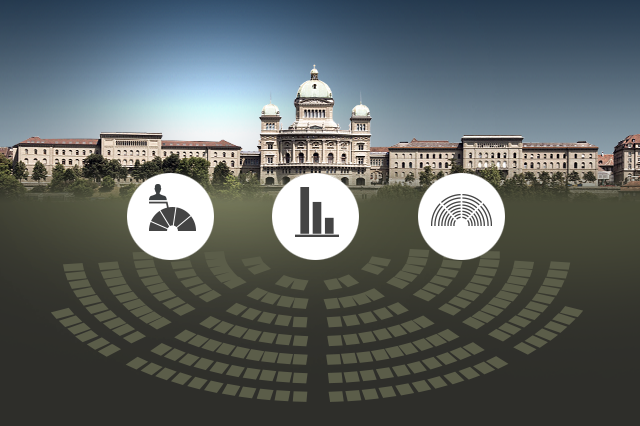How global warming and young voters swung the Swiss elections

Young, highly-qualified voters in urban regions are behind the spectacular surge of Green parties in Sunday’s elections to the Swiss parliament, according to researchers.
An opinion poll published by the Sotomo research institute has found that the Green Party and the smaller Liberal Green Party were the most successful in mobilising their grassroots and winning over new voters.
The gains for the two political groups came primarily at the expense of the Social Democrats and were contrasted by a striking level of voter apathy among supporters of the Swiss People’s Party.
SotomoExternal link director Michael Hermann says that climate change has dominated the elections this year, unlike for the 2015 elections, when the main issue was immigration and relations with the European Union.
“Many People’s Party supporters said they stayed away in protest at parliament’s refusal to implement immigration curbs approved by voters,” Hermann told journalists from the Swiss Broadcasting Corporation (SBC), which commissioned the report.
The leading right-wing party in the House of Representatives lost 3.8% compared with previous elections in 2015 – its worst result in 20 years after a long rise since the late 1990s.
For their part, the left-wing Social Democrats suffered on Sunday their worst setback at the polls in 100 years, losing 2% but still remaining the second-largest group.
In contrast, the Greens and the Liberal Greens won 6.1% and 3.2% respectively, record results.
Dominant issue
Debates and street protests about climate change over the past ten months swept aside other political issues, notes the Sotomo report.
Nearly 40% of the more than 20,000 respondents in the poll said that climate warming was a crucial factor for their party-political choice on Sunday.
However, just as many respondents said that rising health insurance costs were decisive. The reform of the old age pension system and Switzerland’s relations with the European Union were also mentioned prominently, ahead of immigration concerns.
More than two out of five respondents also said it was time to reset political balance in parliament, where the two parties to the right held a wafer-slim majority in the House.
New era?
The Sotomo report concludes that the losses for Social Democrats and the People’s Party – both with a large number of supporters belonging to the older generation – means a sea change for Swiss politics.
“To a large extent, the 2019 elections herald a generational change,” the authors say.
Political scientist Adrian VatterExternal link of the University of Bern is more cautious when it comes to such sweeping statements. He points out the high turnout rate among the young generation and in cities. However, overall turnout dropped – notably in rural regions – to just 45%.
“Hardly any of the political experts expected such a clear decline below the 50% mark,” Vatter told public radio SRF.
He attributed the high participation rate among young citizens to the overriding climate topic, saying that turnout among the young generation is still comparatively low in Switzerland.
Vatter also says that the current situation could change easily in future.
“An increasing number of people in rural regions will again participate in votes and elections if other issues are at the top of the agenda, such as immigration, relations with the EU, or Switzerland’s agricultural policy.”
Setback
The decreasing turnout is also a concern for the Organisation of Swiss Abroad (OSA), which represents the interests of expatriate Swiss across the world. Some 180,000 of them have registered to take part in votes and elections in Switzerland.
Based on figures from ten of the country’s 26 cantons, the OSA says participation plummeted by up to 10% compared to 2015 because of a lack of an e-voting option.
“The sharp decline in turnout is a huge step backwards for Switzerland, which grants its expatriate citizens to right to participate in politics,” an OSA statement says.
After more than 15 years the government suspended trials with e-voting in June amid cyber security concerns and growing political opposition.
The Federal Statistics OfficeExternal link also published figures about the party preference of expatriate Swiss in the latest elections. As shown in the chart below, Swiss Abroad voters clearly favoured the Green Party, even more than domestic voters in Switzerland. The opposite phenomenon is apparent in the case of the People’s Party.
Sotomo polling details
The online election poll is based on responses from 20,645 people.
It was carried out between October 18-21 by the Sotomo research institute on behalf of SBC, swissinfo.ch’s parent company.
The margin of error is between +/-1.1% and +/-2.5% depending on the issues addressed.

In compliance with the JTI standards
More: SWI swissinfo.ch certified by the Journalism Trust Initiative







You can find an overview of ongoing debates with our journalists here. Please join us!
If you want to start a conversation about a topic raised in this article or want to report factual errors, email us at english@swissinfo.ch.